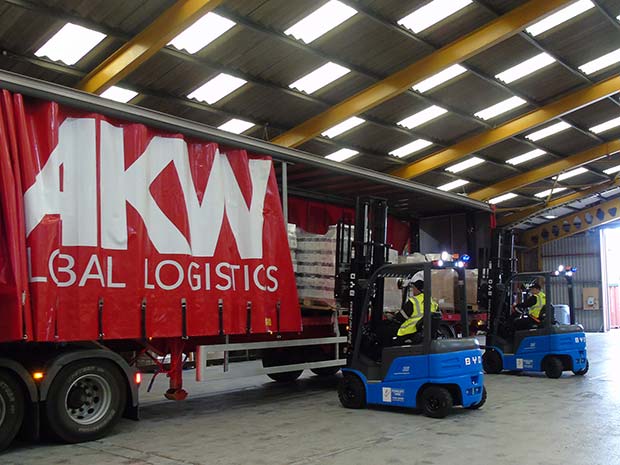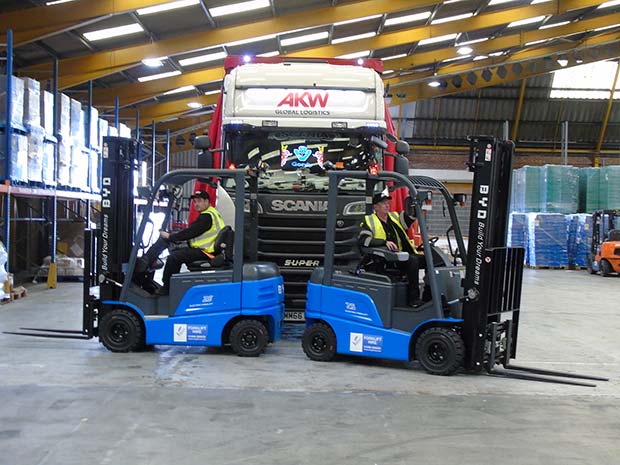At AKW Global Logistics, having a positive sustainability impact is always to the forefront of purchasing decisions, with focus on continuous improvement and carbon reduction initiatives. With this in mind, in March 2018, Operations Manager Jason Bradley contacted Kevin Gorman, Managing Director of Skelmersdale based BYD Lithium specialist, Easylift Materials Handling, to discuss the concept of Lithium Forklifts to replace a number of their diesel powered machines.
 Concerns with Lithium powered trucks mainly surrounded practicality; in such a fast-paced environment, uptime and productivity are essential. AKW had already started to use hybrid cars with a view to reducing their carbon footprint, as well as installing 164 Ultra low energy LED lights in their Alba Way Pallet Hub; lithium forklifts were therefore the next logical step.
Concerns with Lithium powered trucks mainly surrounded practicality; in such a fast-paced environment, uptime and productivity are essential. AKW had already started to use hybrid cars with a view to reducing their carbon footprint, as well as installing 164 Ultra low energy LED lights in their Alba Way Pallet Hub; lithium forklifts were therefore the next logical step.
Although keen to implement electric forklifts, AKW were apprehensive as their 14 hour nonstop utilisation would normally require spare batteries, resulting in challenges such as battery changing impacting time utilisation, battery maintenance and associated training, extra staff responsibility for recharging and operational problems if this task was missed. Lead acid batteries can often take up to 8 hours to recharge creating extra downtime, ventilation would also be required for acid emissions along with precious storage space to accommodate each spare battery which can weigh up to 1800kg. These batteries would then need to be exchanged mid-way through the shift.
Easylift visited the operation at AKW multiple times carrying out both cost and CO2 analyses using BYD designed software. This software enabled AKW to analyse factors such as the cost of diesel used in the current forklifts, the cost per kw of electricity required for charging the Lithium batteries, hours of usage, type of mast required, available recharge times, rest and break periods along with mains electricity supply requirements.
The analysis compared favourably from a financial perspective, the Lithium option produced a lower Total Cost of Ownership (TC0) although the investment costs are slightly higher, overall running costs are far lower than Diesel in this particular application and LPG in others.
Whilst the production of electricity does create CO2 (as a percentage of electricity is created at coal or oilfired power stations), from an environmental perspective there was a reduction of around 154 kilograms of CO2 per week per forklift by switching to BYD Lithium from the existing diesel forklifts.
 Operationally, the BYD simulator also confirmed that with a short charge at the mid shift break, the machines were more than capable of covering the 14 hour shift.
Operationally, the BYD simulator also confirmed that with a short charge at the mid shift break, the machines were more than capable of covering the 14 hour shift.
Although BYD are a major global manufacturer of Lithium powered vehicles and are noted as market leader in their sectors, AKW wanted to see if the superfast BYD charging concept coupled with the 80-volt power output would stand up to their intense workload and therefore requested an onsite trial.
Additionally, AKW also insisted that as part of the trial, the machines function parameters were set to the maximum in areas such as traction speed, acceleration and hydraulic operation. This was due to the fact the BYD machines had to be equivalent with the speed of their diesel trucks as even a slight reduction in these factors would potentially have a huge productivity impact for AKW. By having all functions on maximum, it also helped to establish how long the batteries would last under constant load and maximum current draw.
The trial took place over a number of weeks and proved highly successful, with no lack of power at the end of the 14-hour shift. This resulted in AKW placing an initial order for two 2.5 ton machines c/w sideshifting fork positioners, 540 a/h maintenance free batteries and 200 amp superfast chargers.
The trucks will continue to be monitored over the coming weeks and months and if as expected the results are favourable, AKW plan make further investments in the technology in the future.
BYD




Comments are closed.